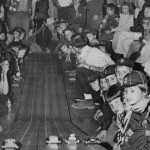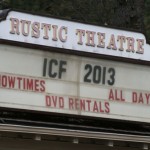Editor’ note: The terms of three Idyllwild Fire Protection District Commissioners expire in December. All three incumbents — Commission President Rhonda Andrewson and Commissioners Ralph Hoetger and Henry Sawicki — are seeking election to another term. Andrew Balendy is also on the November ballot challenging the incumbents for one of the three seats.
The Town Crier has interviewed each candidate and these interviews appear in this edition of the paper in alphabetical order by last name.
Rhonda Andrewson
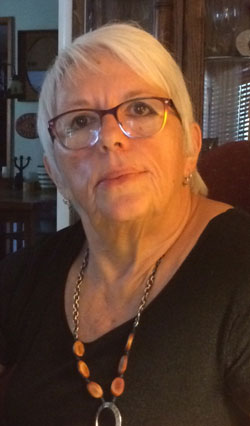 By Marshall Smith
By Marshall Smith
Correspondent
Current multi-term incumbent and board President Rhonda Andrewson brings a Kansas sense of down-to-earth management to running IFPD board meetings. Kansas born, Andrewson grew up in Whittier, living next door to her grandparents. She and husband Don both worked in medical service industry positions — Don in medicine outside sales and Rhonda in central scheduling. In 1997, they visited and soon moved to Idyllwild.
Once ensconced on the Hill, Rhonda worked for the Idyllwild Volunteer Fire Company and became secretary for the IFPD board in 2013. She has remained with the department as commissioner since then.
“I feel the fire department is the community and has been since 1946,” she said. “The chief and staff are community-oriented. And residents with regular medical issues know that the department is there for them to give them regular care.
“As a commissioner, I believe we must do our best to keep the district solvent and to keep the community whole. I’d love to see IFPD serve a larger area because we can provide better medical service, given that we have four ambulances — three frontline and one in reserve. We have local service with our ambulances here and have more personnel.”
When asked if having agreed to sending the closest-available unit would leave too few personnel to man the station, Andrewson said they’ve always been able to cover workload and keep shifts running smoothly with the dispatches that had been made.
As to what could have been done better to help pass the last fire parcel-fee increase measure, Andrewson said, “I think the last time we ran it there was not much more we could have done to promote it better. I think the largest draw we had at a meeting was maybe eight people. The fee has been the same $65 for decades and our budget has increased considerably with more expensive equipment and maintenance charges. I think we need to work a year out before putting it on the ballot again. It’s [the fee increase] definitely needed to maintain and upgrade our equipment.”
She said she believes failure of the measure might have been because voters thought the money would go to salary increases. She noted the average age of equipment is 10 years and that maintenance costs are high. “And we’re looking at future capital improvement for new ambulances to keep medical service equipment in the top of the line.
“I think there’s an educational component to living in the mountains [that residents and votes need to understand]. You don’t medically treat and take care of yourself in emergencies, and you don’t put out your own fires. This department is here to get you off the mountain in rain, sleet or snow, and the cost of transporting does not go down.”
She noted reserves (although they are not called that per se) are perhaps $73,000 but that a new ambulance costs $150,000 with nothing in it.
Regarding the necessity of an assistant chief, Andrewson noted the board supervises the chief, and the chief supervises his department, including determining whether there should be an assistant chief. “It was the chief’s desire to have an assistant chief.
“Firefighters and law enforcement are not different. They are all there to save lives. They all work together in an integrated command. We could not be effective without that cooperation.”
Andrewson proposes more post office interaction, more tours of the department and open houses to see how firefighters live and are being trained; more opportunities to bring the community into the bay area; to look at vehicle records and maintenance costs. “What it takes to keep all this going is the visual that I would like people to look at, to see how hard it is to make ends meet,” she said. “I’m happy to serve.”
Andrew Balendy
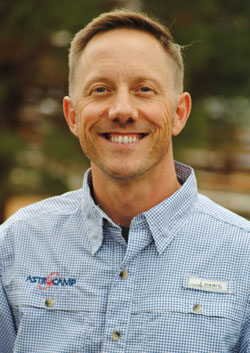
Photo by JP Crumrine
By JP Crumrine
News Editor
Andrew Balendy is seeking a seat on the IFPD commission. For the Idyllwild resident, this is his first political campaign.
He has been director of AstroCamp for five years and with its parent company, Guided Discoveries, for 18 years. And similar to many Idyllwild residents, he is not an Idyllwild native. Balendy is from Scranton, Pennsylvania.
He is a marine biologist with degrees from Penn State and Scripps. Now, he is married and they have a 2-year-old daughter.
“I’m looking for ways to play a larger role in the community,” Balendy said about his entry in the IFPD commissioner’s race. “It made the most sense to join the fire commission. It’s where I have the most to offer.”
While he is not a former firefighter, he has his emergency medical technician training, with an emphasis in wilderness EMT. Balendy also administers a very large program at AstroCamp.
For Guided Discoveries, he manages facilities with 200 people, nearly 100 at AstroCamp in the summer, along with more than 300 children.
“We have 18,000 students through the program and have to be very proactive,” he said. For the camp, he has to have plans for and staff prepared to evacuate in case of an emergency, and access to emergency medical services.
This summer, he actually had to implement his evacuation plan when the Cranston Fire started. He and staff were prepared. As they drove toward Banning, they passed busses coming to Idyllwild to help evacuate other camps and residents.
“I thought [the IFPD commission] would be the best way to participate in the community,” he added, “and I’ve been encouraged to focus here.”
But fires, which he has experienced, are not the only concern he has for the community. Balendy has conducted considerable earthquake training for his AstroCamp staff.
“Safety and welfare of the children requires planning and training. We’re the line of defense until the first responders arrive,” he noted.
He recognizes that IFPD has two goals — fire protection and emergency medical. “Both are important,” Balendy stressed. “We want to prevent fire and reduce its spread, but it’s a natural part of this ecology. And we need to provide emergency medical service.”
But his bottom line is “we always need them when you need them.” In other words, there is no balance between the two goals; the department has to be prepared to provide whichever is needed in the moment.
As a result, he accepts that the expansion of the IFPD ambulance service beyond the district is a necessary service for which voters must pay.
“Especially for car accidents; if there is blood loss, time matters. Some help is better than before,” he said.
Consequently, he sees a need for a future parcel tax measure. “A community cannot be successful as a community without all the basic needs,” he argues. “And we pay for these needs. There is oversight of the department’s spending of funds and we must recognize the cost of doing business is going up.”
The measure is still important with the net positive income the past two years. “These funds should be set aside for capital improvement and investment,” Balendy urged. “You never know what will occur, i.e., more fires. Then you’ll need those reserves. You almost never have enough for a rainy day.”
He is not surprised that Idyllwild Fire has an assistant chief as well as a chief. On his projects, with a staff of 12, there is always an assistant director. “It’s not purely administrative functions, you never know what might happen.”
Balendy realizes that he is not well known in the community. He plans to be more visible this month during the Art Alliance’s Art Walk and Wine Tasting and the annual Halloween Parade.
“I have a science background,” Balendy concluded. “I like evidence and want to make informed decisions. I’m very rational. I’ll encourage serving the community’s need through planning for the future.”
Ralph Hoetger

Photo by Marshall Smith
By Marshall Smith
Correspondent
Appointee Ralph Hoetger vies for a seat on the IFPD board.
Hoetger, appointed to the board in April of this year, is running for a full four-year term. Hoetger was appointed even though a former IFPD fire chief and the former mayor of Banning were in the running for the seat.
Hoetger has a wildly varied educational and career résumé. He had a football scholarship to Azuza Pacific University with a premed educational target. Injury canceled the scholarship. He received a Bachelor of Arts in physical education, then a Master’s degree in physical education exercise physiology at Long Beach State. He was a doctoral candidate in exercise physiology at Utah State University, Salt Lake. His thesis, “Effects of Leg Work on Arm Work Rate Pressure Products” was considered groundbreaking.
After five years at American Medical International, a hospital management company, at which Hoetger introduced and supervised new eating disorder programs in 500 hospitals in the Carolinas, he and his family moved back West.
After graduating from the Los Angeles County Sheriff’s Academy and a stint with the Torrance Police Department, Hoetger took up his present employment as maintenance director at Astrocamp Idyllwild and its sister educational facility on Catalina Island. He’s a licensed pilot, and served with Riverside Mountain Rescue Unit in search and rescue for 17 years before retiring.
“I like being involved in the community and looked at how my skills match this position [at IFPD],” said Hoetger. “The last six months on the board has been eye opening. In 2007 and 2008, when there were many transparency issues, I was a skeptic about departmental management, but believe the department has made a significant turnaround and improvements since then.”
He noted the department has two missions — emergency service and firefighting, with emergency service as the primary function in Idyllwild with firefighting a major part of mutual aid. “We don’t get enough to run on medical [emergency service]. There are so many uncompensated medical trips where insurance or the individual does not or cannot pay,” he noted. “Our off-Hill, mutual-aid firefighting is good for state reimbursement and helps our budget. It also makes other companies more willing to come here when we’re in need.”
He stated it costs $2.5 million to run IFPD compared to $3.8 for Cal Fire stations. “You get less service with their stations. They have one ambulance on call and we have three [frontline] and one in reserve, and we run the department for less.”
As to the parcel measure the department expects to float again in the future, Hoetger said, “We definitely need it to upgrade our equipment. What knocks us down [in passing an increase in the fire fee] is the newspaper. I was in the same place 10 years ago [faulting department transparency] but the department has changed. I’d love to see the newspaper and the fire department mend fences to serve the community better.”
Regarding reserves, Hoetger said, “The district reserves are not overwhelming. Without mutual-aid reimbursement, we’d have major problems. This year was a very active fire season, but what if that changed? Reserves [although not called that] are not growing at the rate needed to replace equipment. When we float this measure again, it will allow us to create a real reserve that can be added to each year, not simply rolled over. We can then look at funding a new staff position, and upgrading and maintaining our equipment.
“Healthy organizations have a cash reserve. One of the values of passing the measure would allow the Idyllwild Fire Protection District to create a reserve that would go to capital improvement (new equipment) when needed, funding the captain position we currently have open and to allow us to continue to annually roll over the existing replacement line item for operational expenses and use it as needed.
“Currently there is no capital reserve and therefore no cushion if an expensive piece of equipment goes down or has timed out on its duty cycle.”
“We need to continue inspections and property owners need to continue to abate their land, creating fire-safe zones around their land.” He noted that significant property abatement by Idyllwild property owners had helped firefighters beat back the Cranston Fire.
As to whether the department has too many or too few captains, Hoetger said, “We need a captain for each engine and enough to cover all shifts. As to having an assistant chief, when Mark LaMont goes out on mutual aid, he needs to be respected and the title is important.”
Hoetger is taking no campaign donations and will campaign at the post office to introduce himself and answer questions.
As ex-law enforcement, Hoetger noted that yes, law enforcement and firefighters are both first responders, but that with law enforcement, a captain typically supervises more personnel per shift and routinely deals with life-threatening situations. “At a department such as IFPD where most calls are for emergency service, captains supervise fewer staff and most medical service calls to the community don’t place responding personnel at risk to life and limb. But the mission of both firefighters and law enforcement is to save lives.”
Finally, Hoetger encouraged community members to attend IFPD board meetings. “I think it’s appalling how little turnout there is for fire meetings,” he said. “Don’t complain if you don’t show up.”
Henry Sawicki
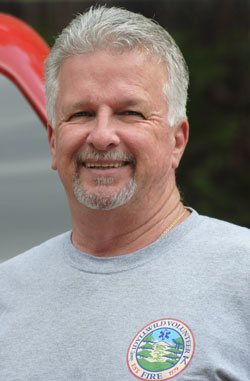
By JP Crumrine
News Editor
Henry Sawicki, a retired Riverside County Sheriff’s Department lieutenant, was appointed to the IFPD commission in February 2017.
He replaced former Commissioner Nancy Layton, who resigned, and has completed the remainder of her term. He is now seeking a full, four-year term.
He retired from the Sheriff’s Department in 2009 after 29 years of service. However, law enforcement was his second career choice. After growing up in Massachusetts, he gravitated west to Blythe where his sister lived. He spent seven years as a volunteer desert firefighter. Unable to find a permanent firefighting job, a friend encouraged him to join the Sheriff’s Department. His brother, who remained in Massachusetts, was a firefighter.
Blythe is where he met his wife, and they have three grown daughters and four grandchildren who two live in the Hemet area and San Diego.
“For a town this size, to have its own fire department, nowhere else has this,” Sawicki said proudly. And as a commissioner, he wants to continue and, where possible, improve the service to residents.
One that caught his attention, partly from his knowledge of county operations, was the issue of “closest ambulance.” Sawicki perceived the difference in interpretation of this policy between the county’s Emergency Medical Services Agency and IFPD.
But he asked himself and his colleagues the question, “What’s best for citizens here and people driving up and down the Hill?” In May, the county agreed that the closest-available ambulance, whether American Medical Response’s unit in Pine Cove or an IFPD unit, would be dispatched first.
As a commissioner, his priority is to reintroduce a measure to increase the parcel fee to benefit the emergency services work. He was an Idyllwild resident in 2016 when Measure W, the last effort to raise the fee, was on the ballot. Despite garnering 57 percent of the vote, the district needed two-thirds for its passage.
“I wasn’t involved in the marketing,” he said. “But I did learn afterwards that its purpose was not clear. This time I want to make absolutely sure people know why we need this — absolutely!”
Sawicki adamantly supports the need for more revenue. Although the last two fiscal years have resulted in positive cash balances, he points to several issues that will require more funding to resolve.
For example, in 2012, firefighters accepted wage reductions to help quell budget deficits. “They still are not whole for this,” he argued. “The chief refuses any new salary until the staff has been helped. In addition, some major equipment will need replacing within a few years.”
During the Cranston Fire, Sawicki volunteered at the Idyllwild station. During this service, he noted how often IFPD was dispatched. Consequently, its crew and equipment were frequently out of the station.
“Everybody was out and only one truck to back fill. I’m looking at different things. Maybe we should buy another brush rig or another unit,” he said.
All of this is for the benefit of residents and visitors,” Sawicki stated. “Nearly 80 percent of the calls are medical aids.”
While IFPD does charge for transporting a patient to a hospital, he notes that often the department does not receive its full cost. Medicare and Medicaid limit the amount of their reimbursements.
“We’re not here to make money. We’re not a for-profit organization,” Sawicki stressed. “But even if we recovered one-third of our ambulance costs, we’d still need additional funds.” Further, he noted that the IFPD ambulance fees are in-line with fees for other regional ambulance companies.
When asked about the effect on the budget of the increased workload now responding to more medical calls east and west of Idyllwild, Sawicki had no problem.
“If we can get there faster, we’ll do it because someone out there needs help,” he said. “At the end of the day, we don’t say, ‘It costs too much.’ We are prepared for the increased workload.”









